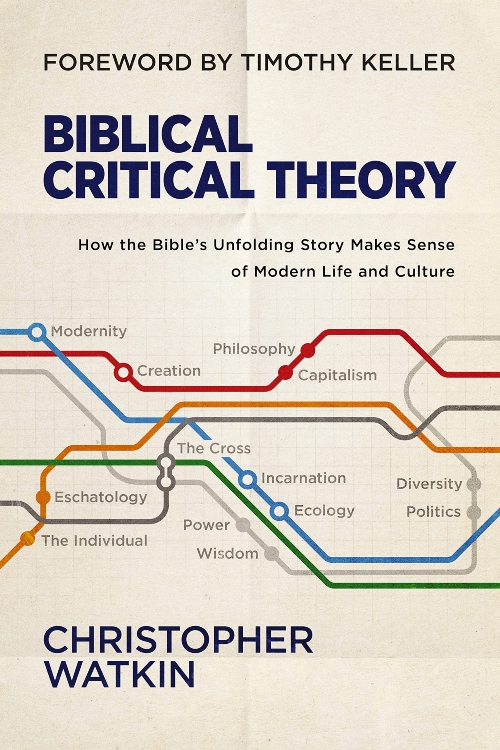Biblical Critical Theory by Christopher Watkin
'Complicated, yet provides a rich set of study tools for understanding the Bible and for easing our way into conversation with the culture around'
 Biblical Critical Theory - How the Bible's Unfolding Story Makes Sense of Modern Life and Culture
Biblical Critical Theory - How the Bible's Unfolding Story Makes Sense of Modern Life and Culture
By Christopher Watkin
Zondervan Academic
ISBN: 978-0310128724
Reviewed by Terry Young
When a friend emailed me in January to say that he and his wife felt that Chris Watkin’s Biblical Critical Theory would ‘be a highly significant book for our age’, I decided to get my hands on it. I’d read and enjoyed Thinking Through Creation, so I was looking forward to this. Now I’ll try to persuade you to read it, even though it’s a thick book containing quite complicated ideas.
At the end of his magnum opus (p 603), Chris explains that he has trodden a path into the Bible through the important features of our age. He has certainly done that and provides us with a rich set of study tools for understanding the Bible and for easing our way into conversation with the culture around.
Perhaps the easiest to grasp of these tools is what he calls diagonalising, which is a way of addressing opposites in a society and showing how the Bible refuses to be drawn to one extreme or the other. Taking an example at random (p 262), he shows that when it comes to crime, the left is keen on compassion and dealing with the causes of crime while the right focuses on justice, punishment and protecting society. To diagonalise this he quotes Exodus 34:7 where God is described as gracious and merciful, but implacably opposed to clearing the guilty.
Chris uses this tool for theology, as well as in politics and culture, for instance, by showing how the Christian doctrine of the Triune God diagonalises the popular position that ultimate reality must either be absolute or personal (p 38). Once you get the idea, you can look at most modern problems in terms of their opposites, and consider the way in which the Bible cuts the cake in radically different ways.
As I read, I found myself constantly trying to work out what sort of book this was. It’s not apologetics because it doesn’t actually tell you how to address the challenges you might face. Instead, by giving you a set of tools Chris is encouraging you to think your own way through these problems and come up with a way of presenting the gospel to your friends whose backgrounds may be secular or from other faiths. His immediate aim is to create conversations rather than converts, so you have to invest your own sweat equity if you are to open up such conversations and use them in evangelism.
I love the way Chris starts in Genesis and works through to Revelation in order to pick up the big picture. Most of us aren’t used to spending this long in Genesis or Revelation and are more comfortable with a storyline that lingers in the gospels or the letters. Chris’ approach highlights how we have neglected Genesis and Revelation and how foundational they are.
It also reflects his belief, as a language lecturer, in the power of narrative, especially overarching narratives. For instance, without the fall, we have no explanation for beauty and intermingled ugliness in all around; while if we lose sight of final judgement, we have no motivation to accept people as they are or any protection against our urges to punish them unmercifully for their faults. Thus, social media which cannot believe in hell, creates hell for those out of step with a majority view.
I loved meeting old friends again – GK Chesterton, CS Lewis, and Francis Schaeffer – while it gave me an appetite to read Augustine’s City of God, which is the seminal work that got Chris going in the first place. While there are topics that I’d like to have seen covered more fully – the ultra-modern science sceptics, for instance – Chris is also candid in explaining that he writes from where he is, and that there is room for others to build on this platform.
Given that most of those reading this review will be juggling families and church and work, and other responsibilities, why should anyone read anything as long and complicated as this? I suppose it’s a bit like trying to persuade you to earn £1 million in the next fortnight. It sounds a nice place to end up, but also crazily impossible.
If we can set the crazily impossible aside for now, I think there are three things you’ll gain. First, Chris shows us that there are sound ways for Christians to enter into dialogue with those around them. We don’t have to be on the back foot, and he points to many places where those around live with deep contradictions and where we can present strong Christian alternatives.
Second, he teaches us an approach that sees the best in society around and encourages us to explain how that connects to the gospel offer.
Finally, you’ll feel a growing sense of the Bible’s coherence and unity and how it tells a story that is worth believing, and entirely believable.
If you can find a way to do the crazily impossible and read this book, I believe it will be a great blessing to you. Enjoy…
Terry Young is a missionary kid who read science and engineering. After a PhD in lasers, he worked in R&D before becoming a professor, when he taught project management, information systems and e-business, while leading research in healthcare.
He set up Datchet Consulting to have fun with both faith and work and worshipped at Baptist churches in Slough for 19 years before moving to the New Forest
Baptist Times, 02/06/2023